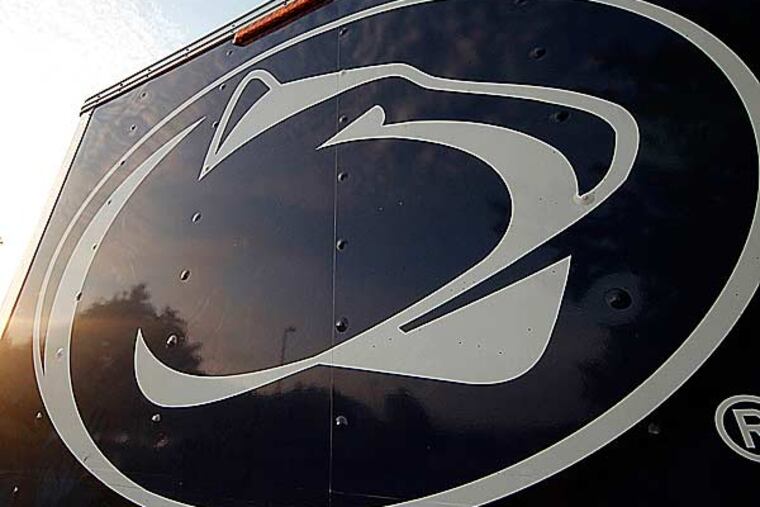Fight brewing over Penn State fine
With a $60 million endowment on the line, a fight is brewing over the NCAA's plans for abuse prevention in the wake of the Jerry Sandusky child-sex scandal.

With a $60 million endowment on the line, a fight is brewing over the NCAA's plans for abuse prevention in the wake of the Jerry Sandusky child-sex scandal.
College sports' governing body hopes to use the money - funded by fines assessed against Pennsylvania State University - to tackle the problem nationwide. Meanwhile, Pennsylvania lawmakers argue the state's money should be spent entirely within its borders.
But amid the increasing tension, child advocates worry that the territorial debate over the money has overshadowed more critical questions of how the money could best be used.
With what is predicted to be $3 million to allocate toward child-abuse prevention efforts annually, the fund is not likely to provide the necessary support for long-term services such as abuse counseling or prevention programs, they say.
"It's not a ton of money when you're talking about a nationwide problem," said Cathleen Palm, director of Protect Our Children, a coalition of state advocacy groups. "You have to be careful how much of this would be dedicated to programs that would need continuing resources."
The $60 million endowment was established in July as part of a series of sanctions the NCAA levied against Penn State for its handling of the Sandusky scandal.
In announcing the fund, association president Mark Emmert pledged to devote the money to victim services and eradicating "the 'sports are king' mind-set that can so dramatically cloud the judgment of educators."
Sandusky, a Penn State ex-assistant football coach, is serving a minimum of 30 years in prison for molesting 10 boys. Three former top Penn State officials stand accused of covering up early allegations of abuse to protect the college's most lucrative sports program.
So far, the university has paid $12 million of the levy into an escrow account.
But from the start, a handful of Pennsylvania legislators have expressed concern over a stipulation in the agreement between Penn State and the NCAA that pledges only 25 percent of that money to programs operating within the state.
"If you spend all of that money in Pennsylvania, it will have a much stronger impact," said State Sen. Jake Corman (R., Centre) "Spread it out nationally, and you're spreading resources so thin that you're watering down what impact you can have."
Last week, Corman announced plans to introduce a bill that would require the NCAA to spend all of the endowment money within Pennsylvania's borders and threatened to sue to bar the association from doling out money until the state legislature has a chance to consider his proposal.
What authority Pennsylvania lawmakers have over the NCAA, which is based in Indianapolis, remains an untested question, though Corman maintains the legal agreement that set up the endowment is subject to state law.
So far, the NCAA has offered no response to Corman's proposals, which followed similar calls from Pennsylvania's congressional delegation.
Earlier this month, U.S. Rep. Charlie Dent (R., Lehigh) publicly questioned Emmert's response to his similar proposal. The NCAA president said Pennsylvania organizations could increase the chances of a larger allocation by presenting a cohesive plan to the task force charged with doling out the money.
"The victims of Sandusky's crimes were all Pennsylvania residents and his crimes occurred within the commonwealth," Dent said in an interview Friday. "That's a strong argument for keeping the money here."
Asked to comment on the brewing argument last week, an NCAA representative sent links to two past news releases on the creation of the fund task force and did not respond to subsequent requests for an interview.
But even if Pennsylvania lawmakers succeed in limiting the money's geographic scope, questions linger over how the money would best be put to use.
The state's U.S. congressional delegation and the Pennsylvania District Attorneys Association back a plan to devote a significant portion of the money to establishing child advocacy centers across the state.
Such centers, which offer the services of social workers, therapists, investigators, and prosecutors under one roof, are widely regarded by child welfare experts as the gold standard in abuse response.
And large swaths of Pennsylvania - including State College, home to Penn State - don't have such centers.
But annual budgets for the state's existing child advocacy centers range from about $250,000 a year in Bucks County to $1.5 million for the Philadelphia Children's Alliance. The latter group's figure would constitute about half the estimated annual yield of the Penn State endowment.
Seeking funding for additional state money for child advocacy centers is his organization's top legislative priority in 2013, said Adams County District Attorney Shawn Wagner, president of the District Attorneys' Association.
Palm, the child advocacy coalition director, supports the mission of such centers but worries the Penn State endowment could not meet their long-term financial needs.
Instead, she suggests, the limited fund money should go toward research on what child-abuse prevention efforts are most effective. Implementing them should be a state budget priority, she said.
"The same people who are pushing really hard to have this money come to Pennsylvania are the same people who have voted for budgets that have shortchanged child-abuse prevention in the past," she said. "We still need to have a conversation about the state's own financial commitment to the issue."